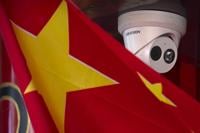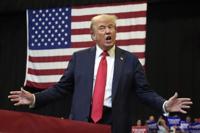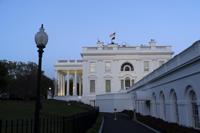WASHINGTON (AP) — China has long been seen by the U.S. as a prolific source of anti-American propaganda but less aggressive in its influence operations than Russia, which has used cyberattacks and covert operations to disrupt U.S. elections and denigrate rivals.
But many in Washington now think China is increasingly adopting tactics associated with Russia — and there's growing concern the U.S. isn't doing enough to respond.
U.S. officials and outside experts cite recent examples of China-linked actors generating false news reports with artificial intelligence and posting large volumes of denigrating social media posts. While many of the discovered efforts are amateurish, experts think they signal an apparent willingness from Beijing to try more influence campaigns as part of a broader embrace of covert operations, according to two people familiar with the matter who spoke on condition of anonymity to discuss sensitive intelligence.
“To us, the attempt is what stands out,” one U.S. intelligence official said.
An in Washington about Beijing’s expansive political and economic goals and the possibility of war over Taiwan is driving calls for the U.S. to make a stronger effort to counter Chinese influence abroad.
Lawmakers and officials are particularly concerned about countries that comprise the “Global South” in Africa, Asia and Latin America, where both the U.S. and China have huge economic and political interests. Many of those countries have populations that support both sides — what an official called “swing states" in the narrative battle.
“This should be a whole of government effort,” said Rep. Raja Krishnamoorthi of Illinois, who is the top Democrat on a newly formed House committee focusing on the Chinese Communist Party.
“The CCP is going around the world bad-mouthing the U.S., bad-mouthing our institutions, bad-mouthing our form of government,” Krishnamoorthi said in an interview. “We have to counter this because ultimately it’s not in the best interests of the United States.”
China's embassy in Washington said in a statement that Beijing “opposes the fabrication and dissemination of false information” and blamed the U.S. in turn for making social media “into its tool to manipulate international public opinion and its weapon to stigmatize and demonize other countries.”
“On this issue, it is for the U.S. side to reflect on itself and stop shouting ‘catch a thief,’” said embassy spokesman Liu Pengyu.
Chinese state media and affiliated channels, as well as with vast followings, routinely spread ideas the U.S. labels exaggerated, false or misleading. In recent weeks, China’s foreign ministry has called attention to the that released toxic chemicals in Ohio as well as allegations the U.S. may have used to transport Russian gas.
The Biden administration has strongly rejected the allegations about the Nord Stream pipelines and defended its response in Ohio.
China has long been seen as less willing than Russia to take provocative steps that could be exposed and more concerned about being publicly blamed. U.S. intelligence judged that Russia in the last two presidential elections, while China in 2020 considered but did not try to influence the election.
But some U.S. officials believe China is now undertaking or considering operations it would not have in the past, according to the two people familiar with the matter. That’s partly due to fears in Beijing that they are losing a battle of narratives in many countries, one of the people said.
Officials noted public examples identified in recent weeks by groups that track disinformation and influence.
The research firm Graphika recently identified AI-generated videos that it linked to a pro-Chinese influence operation. One video attacked the U.S. approach to stopping gun violence; another “stressed the importance of China-U.S. cooperation for the recovery of the global economy,” according to Graphika. And threat analysts at Google said they disrupted more than 50,000 instances of posts and other activity last year linked to a pro-China influence operation known as “Dragonbridge.”
The AI-generated videos are clearly fictitious and Graphika said none of them had more than 300 views. Most Dragonbridge posts, Google said, also reached a tiny audience.
The U.S. intelligence official said Chinese tradecraft on social media was “uneven" and less sophisticated than what's normally associated with the Kremlin. But that tradecraft — both in terms of social media operations and efforts to hide any linkage to Beijing — can be expected to improve over time and with practice, the official said.
And there are longstanding concerns in Washington about TikTok, the viral video-sharing app whose U.S. operations are . There’s no public evidence that Beijing has used its sweeping powers over businesses in China to direct content on the app or launch government-sanctioned influence operations, but there's a belief that China could do so quickly enough not to be caught or stopped.
China is increasingly viewed unfavorably in the U.S., much of Europe, Australia, South Korea and Japan, according to Pew Research Center data published last year.
But in other countries in Asia as well as in much of Africa and Latin America, there are more positive attitudes about the Chinese government, often driven by Beijing’s economic investments and offers of infrastructure and security assistance.
Last year’s Africa Youth Survey, which was composed of 4,500 interviews of 18- to 24-year-olds in 15 countries, found that 76% of respondents believed China had a positive influence in their country. Of the U.S., 72% said they believed American influence was positive.
In the event of a war over U.S.-backed Taiwan, experts believe shaping global attitudes and narratives will be key in ensuring military and diplomatic support for either side.
Rep. Mike Gallagher, the Wisconsin Republican who chairs the new congressional committee on China, said in a statement after recently visiting Taiwan that Chinese influence operations are part of a broader strategy of “cognitive warfare.” He added that the committee would “work to expose the truth about the (Chinese Communist Party's) pattern of aggression against America and our friends.”
The State Department's Global Engagement Center is charged with countering Chinese messaging outside of both the U.S. and China. Speaking on condition of anonymity under ground rules set by the department, a State Department official responded to concerns that the U.S. doesn't directly counter many lines of attack from Beijing.
“There was a decision made that we were not going to get in the business of playing whack-a-mole with specific lines of Chinese messaging,” the official said. “Frankly, there's just too much of it. It would be like trying to put your finger in the dam to stop the leak.”
The State Department instead tries to fund programs exposing facts and ideas that China wants to suppress. The Global Engagement Center has funded third-party research of against Uyghurs and other mostly Muslim ethnic groups. Beijing has long tried to frame its operations in Xinjiang as countering terrorism and radicalism in the face of international criticism about its network of detention camps and its restrictions on movement and religious expression in the province.
State has also funded trainings for investigative journalists in countries that have received Chinese investment and a project that tracked , which is a key source of water for Southeast Asian countries downstream from China.
The U.S. also uses direct investment as a tool for countering Chinese influence, though critics have questioned whether some funded programs are effective.
In one instance, the U.S. Agency for International Development last year proposed using funding from an annual fund for countering Chinese influence to support bakeries in Tunisia. According to two other people familiar with the matter, officials wanted to buy software for bakery owners to help them determine which of their products were most marketable. The people spoke on condition of anonymity to discuss internal agency deliberations.
In a statement, USAID said the Tunisia program was intended to “create sustainable demand-driven jobs” and promote Western software over Chinese programs that “might be easily accessible” but “less efficient.”
“We know that our grants-based assistance can go even further when put together with public and private investments, which far outstrip the resources that the PRC has brought to the table to date,” the statement said.








































